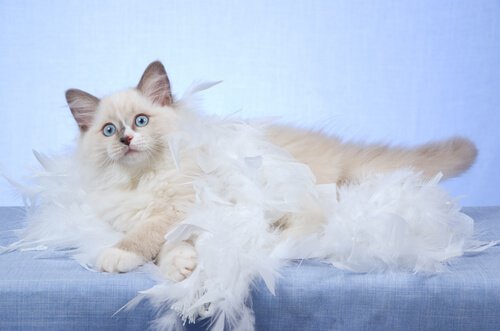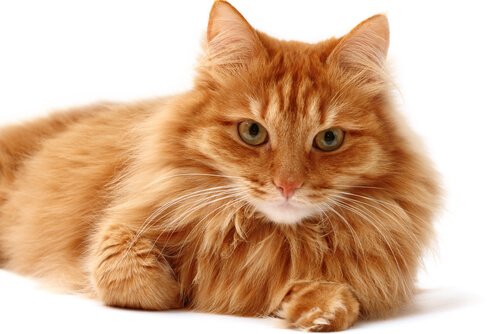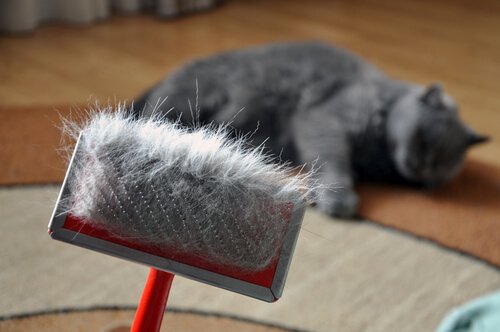5 Things You Should Know about Shedding in Cats

While each cat is unique, there is some essential care provision that every feline needs in order to lead a healthy and happy life. One of them is the proper maintenance of their fur. In today’s article, we’ll talk about shedding in cats and the care needed during this period.
Everything you need to know about shedding in cats
Cats usually shed twice a year, during the fall and during the spring. You should keep in mind that shedding is a completely natural process, and it’s essential to keeping your cat’s fur healthy.
While they shed, cats clearly lose a large amount of hair, and so you’ll have to give them some extra attention during this period. It’s not only a matter of keeping the hair from spreading all over your house. Additionally, you have to be sure you avoid any complications associated with the accumulation of dead hairs or the formation of hairballs in your cat’s intestine.
That’s why we decided to summarize the five things that every owner should know about shedding in cats. This information will definitely help you give your kitten a better quality of life. Are you ready to learn more?
1. The intensity of the shedding isn’t always proportional to the length of the cat’s fur
Generally, we tend to think that cats with long, thick coats shed more than short-haired cats. Although this is the case sometimes, it’s not a rule. That’s because the intensity of the shedding isn’t only associated with the length of the animal’s fur.
Many factors influence shedding in cats. For example, type of hair, the care the owner gives the cat, the climate where the animal lives, its state of health, among other things. However, in general, cats lose a significant amount of hair during shedding season.

2. Hairballs are the main ‘threat’
Cats are very clean animals, and they tend to devote hours every day to their hygiene. In their general cleaning routine, they use their tongues to remove dirt and dead hair from their fur.
Of course, this a good habit and it’s completely natural for them to do it. Felines in the wild also do this to keep themselves free of parasites, impurities and microorganisms that can affect their health.
During shedding season, the cat may intensify his grooming routine, and he may run the risk of ingesting too many dead hairs. As a result, hairballs can form and accumulate in his gastrointestinal tract. This can lead to digestive problems such as gastritis and constipation.
For this reason, hairballs are the biggest ‘threat’ during shedding season. However, as you’ll see here, there are simple and effective methods to combat them in order to keep your cat healthy.
3. Extra brushing for health and beauty
Like we said, keeping your cat’s fur healthy is essential throughout the year. While the cat is shedding, it’s even more important to increase the frequency of your brushing; this will keep him from swallowing dead hairs.

Ideally, you should try to brush your cat on a daily basis and make sure you’re using a brush that’s suitable for his hair type. This will eliminate impurities and dead hair, in addition to keeping his coat shiny and improving its overall appearance.
4. Natural herbs to help the cat purge
If your cat has ingested too much dead hair, his body will need to purge in order to eliminate these foreign elements. However, the cat may not always be able to do this himself. In those cases, you can use natural remedies to help him purge.
For example, malt is one of the best natural herbs to help your cat purge, so it’s recommended for the treatment of intestinal hairballs.
5. Food is cat fur’s best ally
Extreme hair loss can also be associated with nutritional deficiencies. Although shedding in cats is natural, you can try to decrease the intensity of it while also strengthening his immune system before, during, and after this process.
Remember that your cat’s diet must include all of his nutritional requirements for his specific age and health state. And, the best way to give your cat the most adequate diet is to talk to your veterinarian.
All cited sources were thoroughly reviewed by our team to ensure their quality, reliability, currency, and validity. The bibliography of this article was considered reliable and of academic or scientific accuracy.
- nutroexpertos.com. 2017. Manual para declarar la guerra a los pelos. Extraído de: https://nutroexpertos.com/wp-content/uploads/2017/11/Ebook3-Pelos.pdf
- Royalcanin. 2009. Cómo combatir las bolas de pelos. Extraído de: https://www.royalcanin.es/descargas/revista/N17_Mayo_2009/Guapo_y_en_forma.pdf
